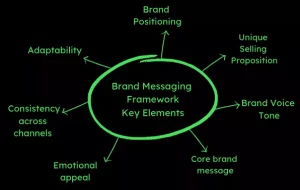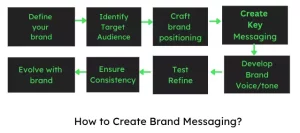What is Brand Message? How to Create a Brand Messaging?
Memorable brand message is important when you talk about a successful business.
Warren Buffet in the wake of impactful branding mentioned once, “It takes 20 years to build a reputation and five minutes to ruin it. If you think about that, you’ll do things differently.”
How you want to present your brand is completely your choice. Remember you have to create memories, stories and relationships so that customers keep you in mind.
A brand doesn’t lead the market in one day or two. Take Apple as a brand for example.
Apple’s iconic branding embodies simplicity, elegance, and innovation. With a focus on seamless user experiences, cutting-edge technology, and sleek design, Apple has become synonymous with quality and sophistication. Their brand message communicates a commitment to revolutionising how we interact with technology.
If you are looking for a strategic brand messaging framework read further to understand what is brand messaging?
What is brand messaging?
Brand messaging strategically communicates a brand’s values, personality, and unique selling proposition to its target audience. It is the consistent and coherent message that a brand conveys across various marketing channels to build awareness, create positive associations, and influence consumer perceptions.
Your brand messaging will aim to differentiate your brand from its competitors, create emotional connections with consumers, and communicate your brand’s value proposition. If it is aligned with the brand’s overall marketing strategy, your brand becomes memorable.
Brand Messaging Framework-Key Elements

Key elements of brand messaging include:
- Brand positioning: Clearly defining what sets the brand apart from competitors and how it addresses the needs or desires of its target audience.
- Unique selling proposition (USP): Identifying the unique benefits or features that make the brand stand out and compellingly communicating them.
- Brand voice and tone: You must establish a consistent tone that connects with your brand’s personality. It should also resonate with what your audience is looking for.
- Core brand message: You must carve a memorable message that captures the essence of the brand. Keep in mind that you have to communicate the value proposition effectively for the audience to retain info about your brand.
- Emotional appeal: Creating an emotional connection with consumers by aligning the brand’s messaging with their aspirations, desires, or values.
- Consistency across channels: Your brand’s messaging must remain consistent across various touch-points. Keep the message same across all social media platforms, website, packaging, advertising, and customer service.
- Adaptability: Being able to tailor the brand messaging to different market segments, demographics, or cultural contexts while maintaining a coherent brand identity.
Brand messaging should be refined and updated to stay relevant and resonate with consumers over time. A strong and consistent brand message helps build brand loyalty, attract new customers, and ultimately drive business success.
How To Create Brand Messaging Framework?
Creating effective brand messaging involves a thoughtful and strategic approach.
Here are some steps to help you develop compelling brand messaging:

- Define your brand:
Define your brand’s purpose, values, personality, and unique selling proposition. Understand what sets your brand apart from competitors and how it addresses the needs or desires of your target audience. - Identify your target audience:
Conduct market research to deeply understand your target audience. You can identify the audience keeping the demographics, psychographics, preferences, pain points, and motivations in mind. And then tailor your messaging to resonate with your audience. - Craft your brand positioning:
Determine your brand’s unique position in the market. Identify the specific benefits or solutions you offer and how they fulfil the needs or desires of your target audience. Develop a concise and compelling brand positioning statement communicating your brand’s value. - Create key messages:
Based on your brand positioning, develop key messages that align with your brand’s value proposition. These messages should be concise, memorable, and clearly communicate your brand’s benefits or unique features. Focus on addressing your target audience’s pain points and explaining how your brand can provide solutions. - Develop your brand voice and tone:
Establish a consistent tone that reflects your brand. And determine whether your brand should be authoritative, or friendly, professional or playful. - Test and refine:
Test your messaging with a sample of your target audience to gather feedback and insights. Refine your messages based on their feedback, ensuring they are clear, compelling, and resonate with your audience. - Ensure consistency across channels:
Maintain consistency in your brand messaging across various marketing channels. Whether it’s your website, social media, advertising, or customer interactions, ensure your messaging remains coherent and aligned with your brand’s positioning and voice. - Evolve with your brand:
As your brand adapts to market changes, continuously update your brand messaging. You must stay in tune with the changing needs and preferences your audience’s.
Brand Messaging Framework Example
There are several brands about which we can learn the messaging framework. Here we will discuss Nike.
Brand: Nike

- Brand Positioning: Nike is the leading global sports brand, empowering athletes of all levels to push their limits and achieve greatness through innovation and inspiration.
- Brand Essence: Nike embodies the spirit of relentless pursuit, motivating individuals to unleash their full potential and overcome obstacles to reach their goals.
- Brand Promise: Nike promises to equip athletes with cutting-edge performance products. The brand inspires them through powerful storytelling.
- Target Audience: For Nike, athletes and sports enthusiasts of all ages and abilities who are passionate about their sport and strive for excellence in their athletic pursuits.
- Key Messages: a) Just Do It: Embrace the Nike mindset of taking action, challenging limits, and pushing boundaries. b) Unleash Your Potential: Nike empowers athletes to tap into their potential and achieve greatness. c) Innovation for Performance: Nike’s commitment to continuous innovation delivers top-notch products that enhance athletic performance. d) Inspiring Athletes: Nike celebrates the stories and achievements of athletes worldwide, motivating others to strive for greatness.
- Brand Voice and Tone: Bold, motivational, and inspiring. Nike communicates with an authoritative and empowering voice, using a tone that encourages individuals to embrace their inner athletes and pursue their passions fearlessly.
- Messaging Hierarchy:
- Primary Message: “Just Do It”
- Supporting Messages: “Unleash Your Potential,” “Innovation for Performance,” “Inspiring Athletes”
- 8. Proof Points: Highlight examples of successful athletes, testimonials, and records achieved while using Nike products to reinforce the brand’s performance and quality.
- 9. Consistency: Ensure consistent brand messaging across all touchpoints, including advertising campaigns, social media content, website messaging, and retail experiences.
Conclusion
Brand messaging strategically communicates a brand’s values, personality, and unique selling proposition to its target audience. The consistent and coherent message builds awareness, creates positive associations, and influences consumer perceptions. Effective brand messaging establishes a strong brand identity, connects emotionally with consumers, and differentiates the brand from competitors. For expert assistance in crafting compelling brand messaging, contact Noboru World at hello@noboruworld.com. Let us help you create a powerful brand narrative that resonates with your audience and drives business success.
Also Read – What is Corporate Branding? A Detailed Guide
FAQ
What is brand messaging?
Brand messaging refers to strategically communicating a brand’s values, personality, and unique selling proposition to its target audience. It encompasses a brand’s consistent and coherent messages to convey its identity, purpose, and offerings.
Why is brand messaging important?
Brand messaging helps establish a strong brand identity and differentiate it from competitors. It creates emotional connections with consumers.
How do I create effective brand messaging?
To create effective brand messaging, start by defining your brand’s identity, understanding your target audience, and crafting key messages that resonate with them. Maintain consistency in your brand’s voice and tone across channels and regularly refine your messaging based on feedback and market dynamics.
How can brand messaging help my business?
With brand messaging your business can attract and engage target audience, build brand loyalty, increase brand recognition, and drive conversions.
Can brand messaging evolve over time?
Yes, brand messaging can evolve as your business grows, new products or services are introduced, or consumer preferences shift.
What role does consistency play in brand messaging?
Consistency is vital in brand messaging as it helps build trust, reinforces brand identity, and enhances brand recognition. Consistent messaging across various touchpoints establishes a cohesive brand experience and reinforces key brand attributes.
How can a professional agency help with brand messaging?
A professional agency like Noboru World can provide expertise in developing a comprehensive brand messaging strategy. They can conduct market research, define brand positioning, craft compelling messages, and ensure consistency across channels, helping your brand effectively connect with the target audience.
Also Read – Brand voice: What it is and why it matters



